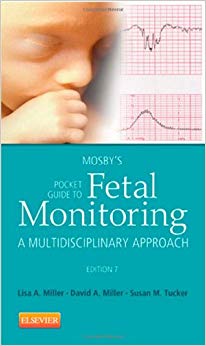
Evaluate intrapartum and antepartum fetal status with this portable, practical guide! Mosby’s Pocket Guide to Fetal Monitoring, 7th Edition provides a multidisciplinary, evidence-based approach model that’s ideal for use in the clinical environment. It offers a single definitive source on fetal heart rate monitoring, with the description, characteristics, etiology, clinical significance, and intervention for every tracing. Written by an expert team including nurse-midwife and attorney Lisa Miller, perinatologist David Miller, and RN Susan Martin Tucker, this reference may be used in any location where electronic monitoring is employed for fetal surveillance, such as the labor and delivery suite, the antepartum inpatient unit or ambulatory care setting, and emergency departments and intensive care units caring for pregnant women.
- Pocket-sized, colorful design offers portability and easy access to information.
- Patient safety and risk management strategies with case study illustrations and legal commentary include guidelines for providing safe and competent care.
- Prioritization of fetal monitoring elements helps you make clinical decisions in areas such as fetal heart rate assessment, evaluation, interpretation, and action planning, all supported by evidence-based practice and literature.
- Descriptions of the relationship between various fetal heart rate patterns and fetal acidemia alert you to important considerations in the care of specific conditions.
- Coverage of innovative practices supports patient safety and improved quality outcomes in high-reliability perinatal units addressing:
- Use of a common language for fetal heart rate patterns with a common construct for interpretation
- Emergency preparedness (multidisciplinary mock emergencies, simulations, debriefing after critical events, and exemplary practice)
- Human factor issues (step-by-step process to improve communication, situational awareness, no-fault/just culture, teamwork, and collegiality)
- Consensus guidelines from the 2008 National Institute of Child Health and Human Development (NICHD) workshop report show how to interpret and manage intrapartum FHR patternsprovide standardized terminology, updates on nomenclature for uterine activity and also include interpretive categories.
- NEW content on fetal dysrhythmias outlines the incidence, identification, and management of this important condition.
- NEW monitor strips throughout the book enhance usability.
- NEW Selected FHR Tracings and Cases: Interpretation and Documentation appendix provides an important reference tool for all clinicians.
- NEW Obstetric Models and Intrapartum Fetal Monitoring in Europe chapter addresses global issues, including variations in terminology, practice, and interpretation.

